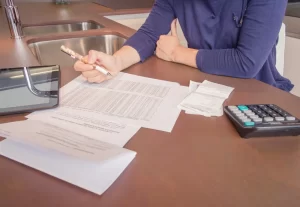A List of Helpful Tips to Effectively Regain Control of Your Finances After Getting Divorced

Divorce can be overwhelmingly stressful, even in the best of circumstances. Since more than 40% of marriages end in divorce, the likelihood of having one is pretty high. Getting a divorce can be expensive, even when it is amicable. It can cost anywhere from $20,000 to $100,000 or more for complex cases involving child custody.
Besides the cost of your divorce, once you and your spouse are separated, you will begin to live on far less income than before. If you were a stay-at-home parent, you would need to find work, maybe for the first time in several years. Depending on your custody arrangement, you will need to provide a space for your child to stay either because they will live with you or because they will have overnight visits.
You will need to prepare yourself to live a lifestyle to which you may not be accustomed, at least at first. Try to keep your eyes on the prize, paying down your debt and saving as much as possible. If you have to pay alimony or child support with an income much lower than before your divorce, things may be tight for a while. Even if you are on the receiving end of those payments, you have a good way to go before achieving financial stability.
It is perfectly natural to feel some panic and preoccupation about your finances. It’s challenging to jump off the edge without a net. Check out our great methods to set yourself on the right track for a brighter financial future.
1. Put an End to Any Shared Accounts
If you and your spouse are living separately and have put the wheels in motion for your divorce, begin with accumulating any information on shared accounts that you will want to cancel right away once the divorce is final. With a new individual account, you can monitor any income you accrue during the time after your divorce and ensure you are not held responsible for debts or payments on a previously joint account that you had with your spouse.
2. Start Saving As Much Money As You Can
If possible, start squirreling away money in an account to be used for emergencies. This rainy-day fund will be there when the alternator on your car dies or your water heater becomes cantankerous. The best reason for this account is to make it possible for you to incur as little credit card debt as possible. Having 3 to 6 months of expenses in this account is a good idea. If you are self-employed or work on commission, it would be better to save more.
3. Be Meticulous about Budgeting and Spending
You should make a monthly and yearly budget that includes income and expenses. Many people create a budget but then don’t stick to it. A budget is a great tool to see how you can use your available income most effectively. Some don’t know how to make a budget because they aren’t fully aware of their expenditures. Sometimes one partner takes care of the finances, and the other hasn’t any idea what gets paid, when, and how much it is. There are hundreds of budgeting apps you can use to get started. It is important to remember to put EVERY expense or income in the app to calculate a realistic budget. When putting an annual budget together, remember to include special costs such as summer camp for the children, Halloween costumes, Thanksgiving dinner, vacations, Christmas, and birthdays. If you are of an age where several of your friends are planning to get married, include their wedding gift too. The ideal budget includes 95% of your financial transactions, no matter how small. You cannot have an accurate guide to smart spending without a budget.
4. Plan For Immediate Expenses
If you are moving out of the family home, you will need to find your own house or apartment to rent until you can get on your feet. You will need to pay a security deposit and first and last rent. Also, you will need household items such as towels, cookware, utensils, furnishings, etc.
5. Avoid Accumulating New Debt
With only one income, that yearly trip to Disney World or that cruise to the Bahamas may have to wait a few years. Frequent shopping trips for your favorite things, be they clothes, shoes, comic books, or mountain bikes, will also need to be put on hold. You may have this sensation of,” After all I have been through, I deserve it.” That may be true, but the more important question is whether you can afford it without taking money away from something you need. Use your credit cards (you shouldn’t have more than two) infrequently and pay the balance off before interest is added. Try to get credit cards with a good rewards system to earn miles and cash back.
 6. Pay Down Old Debts
6. Pay Down Old Debts
It is usually the case that households have a significant amount of debt. If credit cards, the mortgage, and other loans are in your and your spouse’s names, you are still responsible for the debt. If your split is amicable, you can negotiate a way that each will take responsibility for part of the debt. If not, a judge will decide for you, which may not be what you consider the best option.
7. Prioritize Your Credit Profile
You need to know your credit score to apply for an apartment, a loan, or other formal financial applications. If your credit score is puny, there are ways to build it up; The first is to pay your bills on time. Your payment history is integral to your ability to sign a lease or obtain credit. Next, pay down credit card debt to keep your credit utilization below 30%. This means you only use 30% of the credit available to you. Finally, request a full credit report. You never know if creditors have removed debts you have already paid from your credit report, which could be keeping your score lower than it should be.
8. Update Your Records
Make sure utilities are placed in your name alone with the proper address if you have moved. Change your spouse’s access to any safety deposit boxes that you own. Check your health benefits and insurance policies by making the necessary adjustments. Check your 401k, TOD (transfer on death) accounts, and POD (payable on death) accounts. You may want to change the recipient of those funds. Meet with your attorney to make changes to your will, living trust, or insurance beneficiary.
9. Plan For Your Taxes
Many people don’t realize that the way assets are divided could leave one or both spouses with a much heftier tax bill. There are different tax implications for a residence than for retirement assets. In the case of alimony, it is no longer tax-deductible for the payer. The payments are not seen as taxable income to the recipient. Also, after your divorce is official, you will no longer be filing jointly. It is an excellent idea to meet with your attorney to go over how the panorama has changed now that you are no longer married.
Take Advantage of a Free Consultation with Little Falls Divorce Lawyers
Among the many things an attorney can do to help set up a financial plan after your divorce is to help create a payback plan for your debts. They can help with contracts for the sale or purchase of a home. You can have them change your will or living trust to suit your present situation. If you need to transfer the title for vehicles or need to change your name and use it on important documents, your lawyer can help. We have supported clients facing this economic transition after helping them successfully navigate through the divorce process in Ridgewood, Verona, Millburn, Wayne, Montvale, and other towns in Passaic, Essex, and Bergen County.
At the Montanari Law Group, our lawyers know how difficult divorce can be for you. It is an exhausting process, and we want to be there every step of the way, including once your divorce has been finalized. We know how anxiety-provoking it can be to be on your own financially. There are many changes to be made, and every case is unique.
If you just underwent a divorce and have issues surrounding support or changes that must be made to your final divorce decree; or you are just beginning the journey toward ending your marriage; or you find yourself somewhere in between, let us help you start a new chapter in your life. Call our office at (973) 233-4396 to schedule a free confidential consultation. Don’t delay; your future begins now.

